
Shri. Samir Somaiya graduated from Cornell University with a Master's in Chemical Engineering in 1992. He secured an MBA from Cornell University in 1993 and a Masters of Public Administration from Harvard University in 2005. He won the American Institute of Chemical Engineer’s Award for Scholastic Achievement in 1989 and the American Institute of Chemists Award in 1990.
He joined Godavari Biorefineries Ltd in 1993. He has taken the company forward through a focus on economic, social, and environmental sustainability supported by research and innovation. Continuing the heritage of his father and grandfather, Shri. Samir Somaiya plays an active role in initiatives that improve the quality of life of the underprivileged sections of society. Under his guidance, the Somaiya Trust manages over 30 different educational institutions of learning extending from elementary to Ph. D. in diverse areas such as medicine, engineering, the arts and sciences, religion, vocational studies, education, languages, etc. There are over 35,000 students and 1,300 faculty. There is also a 500-bed urban teaching hospital and a 40-bed rural hospital. The Trusts jointly run 8 schools, 6 of which are in rural Maharashtra and Karnataka.
Shri. Samir Somaiya is the President of Somaiya Vidyavihar; Chairman of K. J. Somaiya Trust, K. J. Somaiya Medical Trust, K. J. Somaiya Institute of Applied Agriculture Research, and The Girivanvasi Pragati Mandal.
As a Visiting Instructor in the School of Chemical Engineering at Cornell University, he combines his love for education and Chemistry. He has played an active role in the Sugar and Chemical Industry in India. From 2006- 2008, he was the Chairman (Western Region) of the Indian Chemical Council and the President of the Indian Sugar Mills Association in 2009.
He is a Committee Member of the Green Chemistry Initiative, Constituted by the Principal Scientific Adviser to the Prime Minister; Advisory Board, School of Chemical Engineering, Cornell University, USA; Center for Indic Studies, the University of Massachusetts at Dartmouth, USA and Council of Religious Leaders – Astana, Kazakhstan.
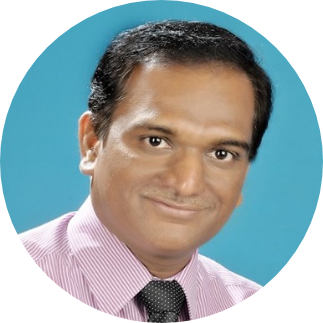
Dr. Nandkumar Kunchge is Director of K. J. Somaiya Institute of Applied Agricultural Research (KIAAR), Sameerwadi, Karnataka. He served agricultural community for more than 30 years through seeds industries (Mahyco, Mahabeej, Bejo Sheetal/ Kalash seeds) as Principal scientist and later as Director (Biotechnology) for six years.
His research interest has been focused on agricultural development applying modern tools, experienced in crop biotechnology: Development of genetically modified crops (recalcitrant crops like Cajanus cajan, Allium cepa), biosafety studies of Bt. Brinjal (A complete make in India product), regulatory affairs, doubled haploids (Solanaceae & Cucurbits), polyploids, plant protoplasts, molecular breeding, micro propagation. Keeps keen interest in precision & organic agriculture with sustainable eco-friendly systems to conserve & enhance natural plethora
Dr. Nandkumar has led multiple projects as Principal Investigator, supported by BIRAC, DBT Govt. of India under PPP model, coordinated for systematization of programs with International linkage to keep pace with global standards (e.g. ISTA accreditation) In this context travelled to more than 12 counties, led technology negotiations with IPR awareness. Dr. Nandkumar has been selected as Cochran Fellow, by USDA, USA in 2015 & represented India seed industry. He is passionate in scientific networking, technology hunting & its judicial applications, He has published a book chapter, five research papers, delivered lectures in training program (e.g. IARI, IIVR), organized trainers training programs, workshops, International Conference (AgTech Global Summit 2012), African delegation study tours (2013-2023). Also mentored more than 25 students for their masters & Industrial sandwich training program (BCIL supported), guided 3 Ph. D students as co-guide, working as Adjunct Professor for Institute of Chemical Technology (Marathwada Centre). He serves as member on board of studies for various Universities.
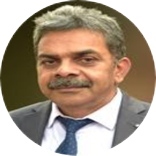
Dr. A.D. Pathak joined as the regular Director of ICAR-Indian Institute of Sugarcane Research, Lucknow on August 4, 2016. During his 31 years-long journeys of research, Dr. Pathak worked for the development of improved varieties of sugarcane for the North-West, North-Central and Eastern Region of the country and contributed a lot for the sugarcane improvement and development. His immense efforts led to the establishment of the Regional Research Centre of the Institute at Motipur (Bihar) and Sugarbeet Breeding Outpost, Mukteswar (Uttarakhand) attaining new dimensions of research work in sugarcane in Bihar and development of sugarbeet varieties in the country. Dr. Pathak was also instrumental in coordinating with State Governments of Uttar Pradesh and Bihar by developing a collaborative programme for healthy seed production of improved and recommended varieties of sugarcane.
Contribution to the scientific advancement: Development of sugarcane varieties as CoLk 07201, CoLk 9709 and Co 89029 for different agro-climatic zones of sub-tropical India. Expansion of area under CoLk 94184 in north central zone; Development of 18 genetic stocks developed through gene introgression from Erianthus species for top borer tolerance in sugarcane; Development of breeding stocks for adaptations to prolonged winter chillness, high temperature and ratoonability under low-temperature harvest in sugarcane for enhancing productivity is sub-tropical India; Development of sugarcane variety as Co 92030 for late-planted conditions after wheat harvest in sub-tropical India; Initiated identification of Central Varietal Release Committee released varieties of sugarcane as recommended ones in states of UP and Bihar which transformed sugar industries is sub-tropical India; Sugarbeet research for adaptation to Indian conditions; Initiated quality jaggery production in India through IISR technology for enhancing profitability of sugarcane growers.
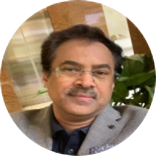
Balachandra Bakshi, the Executive Director of Godavari Biorefineries brings 25 years of valuable experience in the field of fertilizers, sugar, ethanol, and power industry. He oversees Sugar, Co-gen, Distillery divisions and is responsible for coordination with government, regulatory bodies, and other relevant bodies/associations like Mazdoor Union/Employees Association for healthy industrial relations. He is also responsible for public relations for the company.
Prior to this, he was associated with ZuariAgro Chemicals Ltd., Goa for 14 years. He was accountable for the development of the market with farmer training programs/crop seminars and dealers’ network. Mr. Bakshi is a graduate of Agriculture Science from the University of Agriculture Sciences Dharwad, Karnataka.

Dr. Bakshi Ram is educated at Haryana Agricultural University, B.Sc. (Hons) Agri. 1981, M.Sc. (Agri.) 1983 and Ph.D. (Agri.) 1996. He served as Asst. Scientist (Wheat), CCS HAU, Hisar, 1984-86; Scientist, ICAR-Sugarcane Breeding Institute, Coimbatore, 1986-90; Scientist, Senior Scientist and Principal Scientist, ICAR-SBI, Regional Centre, Karnal, 1990-2009; Head, ICAR-SBI, Regional Centre, Karnal 2009-13; Director, UP Council of Sugarcane Research, Shahjahanpur 2013-2014; Director, ICAR-Sugarcane Breeding Institute, Coimbatore 2014 to date.
He has been awarded and honoured with - Merit Gold Medal, B. Sc (Hons) Ag., 1981; Dr. Ram Dhan Singh Gold Medal, M.Sc. (Ag.) Plant Breeding, 1983; Eminent Agriculture Scientist Award (Indian Achievement Award-2005); Certificate of Appreciation (awarded on Republic Day, 2007); Noel Deerr Gold Medal Award, 2010; Certificate of Appreciation (awarded on Republic Day, 2012); Industry Excellence Award, 2013; STAI Silver Medal, 2014; Award of Excellence, 2016; Best Innovator of the Year 2016 (Agriculture); Reviewer Excellence Award, 2016; Best Achiever Award, 2016; Certificate of Appreciation by District Administration, Muzaffarnagar (UP), 2017; Noel Deerr Gold Medal Award, 2017, Development Leadership Award 2017; Noel Deerr Gold Medal Award, 2018; Felicitated/Honoured – by National Sugar Institute, Kanpur, Global Canesugar Services Pvt. Ltd., CCS HAU Alumni Association, Hisar, Minister of Agriculture and Farmers Welfare and 14 sugar mills in North India, 2016-18; President, Society for Sugarcane Research and Development, 2015 to date; Councile or, Sugar Technologists’ Association of India 2018 to date.
He is Fellow of Indian Society of Genetics and Plant Breeding; Sugar Technologists’ Association of India; National Academy of Agricultural Sciences.
The area occupied by CO 0238 sugarcane variety released by him has increased from 2.72 lakh ha (9.84%) during 2014-15 to 23.4 lakh ha (66.1%) during 2018-19 of the total sugarcane area in subtropical states. The variety was recommended in Uttar Pradesh during 2012 and since then it has increased to over 19.28 lakh hectares (69.02%) area during 2018-19. During the last five seasons, average cane yield and sugar recovery in Uttar Pradesh has increased to 80.5 t/ha and 11.46% from 61.6 t/ha and 9.18%, respectively during 2012-13, i.e. an increase of 18.9 t/ha and 2.28 units in cane yield and sugar recovery, respectively. Co 0238 and Co 86032 continued to be the predominant varieties during 2018-19 with about 66.1% and 47.3% area coverage in sub-tropical and tropical regions, respectively. For the first time in the history of the sugar industry in sub-tropical India, on-date sugar recovery of 14.01% was recorded by M/s Bajaj Hindustan Ltd., Bilai (UP) on April 3, 2019, with 96 % area under Co 0238.
In a further step to meet the varietal requirements of the country, the Sugarcane Breeding Institute under his stewardship has released and notified 8 varieties viz. Co 09004, Co 06022, Co 10026, Co 11015 (early maturing), Co 0212, Co 06034, Co 09022, and Co 12029 (midlate maturing) for commercial cultivation in Peninsular India.
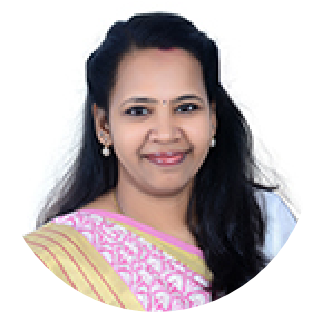
She has a decade and a half years of teaching, research and administrative experience. She focuses on identifying interdisciplinary teams within the University, possible collaborators with mutual research interests, and ideating possibilities to strengthen research dialogue and culture in the University.
Dr. Parvathi has completed her undergraduate in Biochemistry, Post-graduation and a Doctoral degree in Biotechnology. Her research specialization and interest lie in microbial barcoding and diversity studies. Her doctoral research focused on employing micro-diverse clusters of 235 ribosomal segments to differentiate E.coli rom other UTI pathogens, C. koseri, K , pneumonia, and Eaerogenes, and establish their clonality.
She has published in peer- reviewed journals and holds patents for innovative dual-run electrophoretic unit and copyrights for the algorithms and software developed for restriction digestion-based microbial DNA barcoding. Under the SW-MSU Global Alliance on Smart Agriculture and Sustainable Development, she is the home lead for culture-independent studies under the Microbial Solutions thematic area.
The team explores to gain insight into the 'microbial science and their dynamics of traditional liquid manures for microbiome engineering studies and co- design STEAM models for education, research, and outreach verticals. She is a bioscientoonist and is passionate about creating multilingual instructional scientoons and illustrations and building a network of creative educators and communicators.

Larry P. Walker describes himself as a country boy from Detroit, Michigan. He received a B.S. in Physics from Michigan State University (MSU) in 1974. However, his evolving interests in environmental and natural resources challenges lead him to complete M.S. and Ph.D. (1975 and 1978) degrees in Agricultural Engineering from MSU. Dr. Walker was appointed as an assistant professor at Cornell University in January 1979 where he rose through the rank to become a full professor in 1993. During his time at Cornell, he has led multidiscipline research activities focused on pretreatment and scarification of lignocellulosic feedstock, abiotic and biotic interactions in aerobic degradation processes, and the application of systems biology modeling to direct metabolic activities in yeast to drive more carbon to biofuels and bioproducts. His research activities have yielded over two hundred peer and non-peer reviewed articles.
Dr. Walker has served in numerous leadership roles including membership on the National Biomass Research and Development Technical Advisory Committee (2000 -2005) and leadership of the Northeast Sun Initiative, a regional bioenergy and bioproducts initiative, from 2004 through 2012. He is the recipient of the 2008 Michigan State University College of Agriculture and Natural Resources’ Outstanding Alumnus Award. In 2009 he was elected as a fellow in the American Institute of Medical and Biological Engineering. Also, in 2009 he was awarded the Outstanding Faculty Award from the College of Agriculture and Life Sciences Alumni Association. In 2017 he received the Biosystems and Agricultural Engineering Distinguished Alumni Award, College of Engineering, Michigan State University. He is the Co-Editor in Chief for the journal “Industrial Biotechnology” and he currently serves as a Director for Godavari BiorefineriesInc (2009 – Present). For his leadership in industrial biotechnology, he received the “Biotechnology Innovation Organization (BIO) Leadership and Legacy Award” in 2018. He serves on the Governing Board of K. J. Somaiya Institute of Engineering and Information Technology and the Academic Council of Somaiya Vidyavihar. In 2020, he joined the General Body of K. J. Somaiya Institute of Applied Agricultural Research, (KIAAR), Sameerwadi, Karnataka, India.

Paul is a Chief Agronomist of Locus Agricultural Solutions. Locus AG is an agricultural products company with a broad portfolio of microbial and natural products for improved soil health and the environmental benefits driven by improved soil health. He has occupied scientific, development, operations and senior administrative positions with start-up and Fortune 500 companies.
He has extensive international experience and has been a co-founder of several agricultural and renewable-energy based companies with a specific focus on increasing agricultural crop diversity and productivity; improving the nutritional content of food; and increasing the economic stability of rural agricultural communities through more productive agricultural systems. Paul has also served for the past 33 years as an Adjunct Professor of Horticulture and member of the Graduate Faculty at North Carolina State University. He is an Associate Editor of the Journal Industrial Biotechnology where he focuses on agricultural innovation and outreach and is a Chairman of the Governing Board of the Alternative Fuels and Chemicals Coalition. Paul received his undergraduate degree from Lewis and Clark College (Ecology and Secondary Education) and his Ph.D. in Botany and Plant Pathology from Colorado State University where he worked on the development of cropping systems for dry-land agriculture.
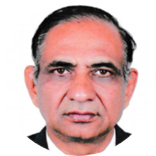
Dr. R. B. Khandagave has done his B.Sc. Agri, M.Sc. Agri and Ph.D. from the University of Agricultural Sciences, Dharwad. He is currently serving as the Director of S. Nijalingappa Sugar Institute (SNSI), Belagavi, since 2013. He has visited Australia (2001), Guatemala (2005), Thailand (2016) and Argentina (2019) to present papers in ISSCT. He has visited Kenya (2003), Brazil (2007) for Somaiya group, and Zambia (2011) for SP Group to survey Cane area feasibility for establishing Sugar Mills. Has attended a seminar on Sweet Sorghum at Nashville, U.S.A (2006).
In SNSI, he is an instrumental in starting a three-year B.Sc. (Sugar Science and Technology) degree course first of its kind in the state, affiliated to Rani Chennamma University and has established a tissue culture laboratory. He has published 58 research papers, 32 popular articles, 3 books and 3 bulletins. He attained a certificate of recognition for SNSI, Belagavi as a Scientific and Industrial Research Organization (SIRO) by the Ministry of Science and Technology, Department of Scientific and Industrial Research (DSIR), Government of India. SNSI, Belagavi is recognized as one of the voluntary Centers for AICRP on Sugarcane. While serving at Godavari Bio-refinery Ltd., Sameerwadi, he has contributed to screening of new varieties for the locality and taken lead role in adopting cane development activities including participatory approach by the farmers in adoption of new technologies in sugarcane. He is a member of the sub-committee for Grant-in-in aid for research project under Sugar Development Fund (SDF), constituted by Ministry of Consumer Affairs, Food and Public Distribution, Government of India; Member of the Sugarcane Control Board constituted by the Government of Karnataka; technical committee constituted by the Sugarcane Control Board for assessing the revenue of sugar factories and providing suggestions to Sugarcane Control Board for fixing sugarcane price in Karnataka; Governing Council member of K. J. Somaiya Institute of Applied Agricultural Research, Sameerwadi; Governing Council member of Bharatiya Sugar, a Journal published from Vasantdada Sugar Institute, Pune.
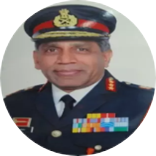
Lieutenant General Ramesh Halagali Param Vishisht Seva Medal PVSM AVSM, SM was the Deputy Chief of the Army staff, Indian Army. Halagali hails from Halagali village in Mudhol taluka in Bagalkot District, Karnataka. He studied at Sainik School, Bijapur in Bijapur district, Karnataka. Halagali was commissioned into Sikh Light Infantry in December, 1972 and was Director General of Military Training until he was appointed as the Deputy Chief of the Army Staff on 11 February 2012. Lt. Gen. Halgali, was a whistle-blower in 2009, for converting 70-acre land adjacent to Sukna military station land scam in West Bengal.
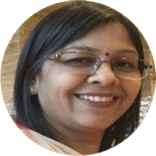
Dr. Sangeeta Srivastava, has recently assumed the responsibilities of The Executive Director of Godavari Biorefineries Limited. She has been associated with the Company for more than 25 years in managing and directing research activities connected with renewable feedstock. Her last position held in the organization was Head of Chemical Business Unit.
She has a Master in Sciences (Organic Chemistry) from Sagar University and a Masters in Philosophy (Organic Chemistry) from Jabalpur University, India. She also holds a doctorate in Chemistry from Mumbai University.
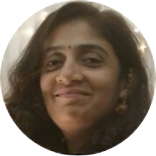
Shyamal Virnodkar likes teaching profession, a noble profession that is why she is here at K. J. Somaiya Institute of Engineering and Information Technology, serving as an assistant professor. She always ensures the things that have been taught in the lectures and/or practical have been understood by good students, average students and especially poor students. She plans every lecture in advance and covers the syllabus from the examination as well as knowledge point of view. She utilizes entire lecture time to impart the knowledge. She has good subject knowledge and lectures are well organized. As a teacher, she always considers the overall development of students. She wants her students to be good and responsible citizens.
She has taught Computer Programming-I, Computer Programming-II, Computer Networks, Operating System, Computer Organization and Architecture, System Programming, Artificial intelligence, Digital Signal and image Processing, Computer Vision, System Security, Theory of Computer Science, Data Structures, Object Oriented Programming.
As a teacher, she is honest and unbiased. She always tries to improve the performance of poor students by making them aware about their current status. She completes her assignment given by higher authorities within the given period with honesty and sincerity. She loves to take new responsibility. At home she likes cleanliness and neatness.
Her parents and teachers play important role in nurturing her life. Things that she learned from her mother are ‘Change in work is rest’, never hurt anybody and be patient. Her keywords are honesty, truthfulness and awareness of own responsibility. She is self-motivated and responsible person.
She has done her schooling at IES’s Mahatma Jyotiba Phule Kanyashala No. 01, Dadar, Mumbai, Maharastra. She is graduated from Datta Meghe college of Engineering, Airoli, Navi Mumbai, Maharastra. She has done master’s in computers from MGM’s College of Engineering, New Panvel, Maharashtra, in 2008. Currently she is pursuing her Ph.D. at College of Engineering, Pune. Her research interests are Image Processing, Remote Sensing and Machine learning. Recently she has published many research papers in peer reviewed journals and international conferences.
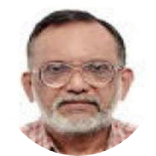
Prof. Udipi Shrinivasa has done his B.Tech. (1969), M.Tech. (1971) from IIT Madras and Ph. D (1976) from Indian Institute of Science, Bangalore. He is a former Professor of Mechanical Engineering, Indian Institute of Science, Bangalore.
His areas of interest and expertise in Mechanical Engineering are Vibration analysis, Finite element analysis, Design optimization, Alternative fuels and Sustainable development of rural areas. Dr. Shrinivasa is the unassuming leader of few words with an unassailable conviction. He was actively engaged in SuTRA (Sustainable Transformation of Rural Areas) programme of the Indian Institute of Science.
His thrust has been to use non-edible oils to ignite a process of rural enrichment. He prepared a Master Plan and executed a Honge Oil programme in 7 villages around Kagganahalli, funded (Rs. 278 Lakhs) by Karnataka’s Rural Development and Panchayat Raj Dept. He served as one of the Honorary advisors for the 15-Cr India’s first Biodiesel project of Southern Online Biotechnologies Ltd., Andhra Pradesh.